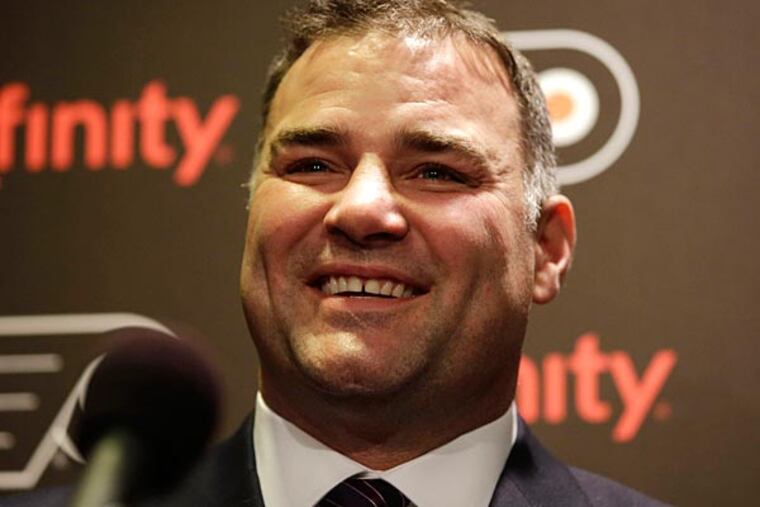Lindros' career seen in a new light
Eric Lindros still plays hockey from time to time. That's a nice thing to think of: Eric Lindros, playing hockey again. He doesn't have to be the marauding, seething supertrain he was during his early and prime years with the Flyers, before the concussions began. He just has to be out there on a rink somewhere, maybe on a frozen pond near his Toronto home, his body thicker, his hair thinner, just skating with a hockey stick in his hands.

Eric Lindros still plays hockey from time to time. That's a nice thing to think of: Eric Lindros, playing hockey again. He doesn't have to be the marauding, seething supertrain he was during his early and prime years with the Flyers, before the concussions began. He just has to be out there on a rink somewhere, maybe on a frozen pond near his Toronto home, his body thicker, his hair thinner, just skating with a hockey stick in his hands.
It's a satisfying image, and Thursday was a night for such thoughts. The Flyers inducted Lindros and John LeClair into their Hall of Fame before a 3-2 loss to the Minnesota Wild, and the ceremony was heavy with nostalgia for and memories of the franchise's teams in the mid- and late 1990s. Nobody does history like the Flyers do, and the presentation, with its familiar faces (Mikael Renberg, Eric Desjardins, Shjon Podein) and sentimental video montages, made the days when Lindros was the NHL's fiercest and most fearsome player feel as if they lasted forever.
"That's the thing about pro sports," Lindros said. "You're not looking at a real long time period. You're looking at a very short, intense moment, and some people are fortunate to stay 20 years in an organization. When you do have a real strong feeling, you cherish it."
But that's the thing about those days: They didn't last forever. They didn't really come close. Lindros was intimidating and entertaining, and he was incredibly productive, averaging a Flyers-record 1.36 points per game, but he played just 486 games for them. That's fewer than six full seasons. The Flyers reached the playoffs with Lindros for the first time in 1995, when they advanced to the Eastern Conference finals and he won the Hart Trophy as the league's MVP. Next season, they were the best regular-season team in the Eastern Conference. In 1997, they reached the Stanley Cup Finals. And on March 7, 1998, the Penguins' Darius Kasparaitis concussed Lindros with an open-ice check, and nothing was the same.
That concussion was the first of six that Lindros suffered over a 27-month period - a succession of head trauma that shortened his time in the league and that renders the controversies and questions that swirled around him here so silly in retrospect. If Lindros' game softened in 1999 and 2000, if he wasn't the same physical force he had been, the present-day appreciation for a single concussion's effects makes his decline nothing if not understandable.
By the time the Flyers traded Lindros to the New York Rangers in 2001, the shadow of Scott Stevens was still chasing him all over the ice, even chasing him out of his natural position of center.
"I played my best hockey here, and the last time I played here, when I was with New York, I didn't have the confidence heading through the middle of the ice," he said. "That's essentially why I moved to the wing. I didn't feel comfortable."
These were things he could not say then, not at a time when a concussion was hardly considered a decent excuse for missing a shift, let alone for wondering whether a player's career might be in jeopardy. For all the strides that professional sports leagues have made in researching and treating concussions, the NHL provided a perfect reminder Thursday afternoon of how far it has yet to go.
The league filed a motion in Minnesota federal district court to dismiss a class-action lawsuit filed by several ex-players who are experiencing post-concussion symptoms. As part of their filing, the NHL's attorneys argued that even in the late 1980s and early 1990s - before the discovery of chronic traumatic encephalopathy and the connection between head injuries and long-term, debilitating brain conditions - there was enough public information available for players to "put two and two together."
Lindros said he had not read either the lawsuit or the league's motion. He has shown no lingering effects from his concussions. He is fortunate, and he knows it.
"I think you're looking at a different era," he said. "Every so often things change. Communication improves. Sensitivity to certain issues improves. What used to be accepted and the norm in previous times is clearly not now. I really think the should-have-known, should-have-done-this, should-have-done-that - you just hope overall that people are healthy and are living lives to their fullest.
"There is a lot more to life after hockey."
It's the sort of realization that comes only with time. Eric Lindros is 41 years old and married, and he has a 4-month-old son, and someday he will hold his son's hand as the boy wobbles on a pair of ice skates for the first time, and he won't be thinking about what else he might have accomplished with the Flyers. That's the thing about fatherhood, about life after hockey. When you have a real strong feeling, you cherish it.
@MikeSielski